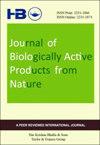抗阿尔茨海默病潜在治疗药物沙蚕豆甾醇的计算机分析
IF 1
Q4 CHEMISTRY, MEDICINAL
Journal of Biologically Active Products from Nature
Pub Date : 2021-11-02
DOI:10.1080/22311866.2021.1970021
引用次数: 1
摘要
在过去的几十年里,医疗保健的改善和进步提高了人们的预期寿命和生活质量。然而,这导致了痴呆症、阿尔茨海默病等非传染性疾病的增加。阿尔茨海默病最常影响老年人,但最近的研究表明,它也可能影响任何年龄组的人。到目前为止,还没有可行的治疗方法或疗法可以逆转这种疾病的进展。现有的几种治疗阿尔茨海默病的药物包括多奈哌齐(Aricept)、加兰他明(Razadyne)和利瓦斯替明(Exelon),它们只能暂时缓解阿尔茨海默病,并伴有腹泻、呕吐、恶心、疲劳、失眠、食欲不振和体重减轻等副作用。天然产物胆碱酯酶抑制剂的有效和增强治疗在研究人员中越来越受欢迎。已知植物甾醇在抑制与AD发展有关的蛋白质中起作用。本研究强调了豆甾醇在缓解AD中的重要性和作用范围。我们的研究涉及QSAR、ADME、分子相互作用和分子对接的使用,表明经过彻底的验证程序后,豆甾醇具有开发作为抑制AD进展的治疗药物的潜力。图形抽象本文章由计算机程序翻译,如有差异,请以英文原文为准。
In silico Analysis of Stigmasterol from Saraca asoca as a Potential Therapeutic Drug Against Alzheimer’s Disease
Abstract Improvements and advances in health care over the past few decades have increased life expectancy and quality of life. However, this has resulted in an increase in non-communicable diseases like dementia, Alzheimer’s Disease (AD), etc. AD most commonly affects the older population, but recent studies reveal that it can also affect people of any age group. As of now, there are no accessible treatments or therapies that reverse the progression of the disease. The few existing medications to treat AD include Donepezil (Aricept), Galantamine (Razadyne) and Rivastigmine (Exelon) provide only temporary relief and come with several side effects like diarrhoea, vomiting, nausea, fatigue, insomnia, loss of appetite, and weight loss. An effective and augmenting therapy with Cholinesterase inhibitors from natural products is gaining popularity among researchers. Plant sterols have been known to play roles in inhibiting proteins implicated in the development of AD. The present study highlights the significance and scope of Stigmasterol, a phytochemical in Saraca asoca in the alleviation of AD. Our study involving the use of QSAR, ADME, molecular interaction, and molecular docking has shown that Stigmasterol has the potential to be developed as a therapeutic drug to curb the progression of AD after thorough validation procedures. Graphical abstract
求助全文
通过发布文献求助,成功后即可免费获取论文全文。
去求助
来源期刊

Journal of Biologically Active Products from Nature
Agricultural and Biological Sciences-Agricultural and Biological Sciences (miscellaneous)
CiteScore
2.10
自引率
0.00%
发文量
21
 求助内容:
求助内容: 应助结果提醒方式:
应助结果提醒方式:


